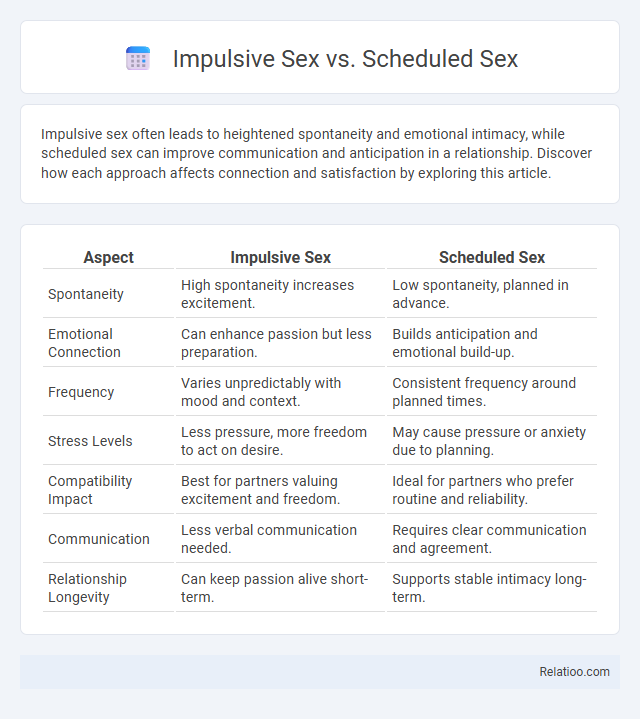Impulsive sex often leads to heightened spontaneity and emotional intimacy, while scheduled sex can improve communication and anticipation in a relationship. Discover how each approach affects connection and satisfaction by exploring this article.
Table of Comparison
| Aspect | Impulsive Sex | Scheduled Sex |
|---|---|---|
| Spontaneity | High spontaneity increases excitement. | Low spontaneity, planned in advance. |
| Emotional Connection | Can enhance passion but less preparation. | Builds anticipation and emotional build-up. |
| Frequency | Varies unpredictably with mood and context. | Consistent frequency around planned times. |
| Stress Levels | Less pressure, more freedom to act on desire. | May cause pressure or anxiety due to planning. |
| Compatibility Impact | Best for partners valuing excitement and freedom. | Ideal for partners who prefer routine and reliability. |
| Communication | Less verbal communication needed. | Requires clear communication and agreement. |
| Relationship Longevity | Can keep passion alive short-term. | Supports stable intimacy long-term. |
Understanding Impulsive Sex: Definition and Dynamics
Impulsive sex occurs without premeditation, driven by sudden desire and emotional arousal, often linked to dopamine release and risk-taking behavior in the brain. Understanding the dynamics of impulsive sex requires recognizing its role in emotional expression, stress relief, or thrill-seeking, which contrasts with scheduled sex's predictability and spontaneity's balance of surprise and readiness. Your awareness of these differences can improve communication and satisfaction in intimate relationships by aligning expectations and emotional needs.
What Is Scheduled Sex? Structure and Intentionality
Scheduled sex involves planning intimate encounters ahead of time, creating a structured approach to maintain physical connection and intimacy. It emphasizes intentionality by setting specific times, which can help couples prioritize their relationship amidst busy schedules or mismatched libidos. This method enhances communication, reduces pressure, and can foster a stronger emotional bond by aligning expectations and desires.
Psychological Factors Driving Impulsive Sex
Impulsive sex is often driven by immediate emotional or physiological urges, such as stress relief, mood elevation, or the desire for instant gratification, which activate reward centers in the brain like the nucleus accumbens. Psychological factors including impulsivity, sensation seeking, and reduced self-control contribute significantly to spontaneous sexual behaviors, differentiating them from scheduled sex that relies on planning and anticipation. Understanding these neural and psychological mechanisms helps explain why impulsive sex can sometimes be associated with risk-taking and emotional vulnerability compared to the more deliberate nature of scheduled intimacy.
Benefits of Spontaneity in Sexual Relationships
Spontaneity in sexual relationships enhances emotional connection by fostering genuine moments of intimacy that resist routine and predictability. Your sexual satisfaction increases as spontaneity encourages creativity and excitement, preventing stagnation and promoting a stronger bond. Unlike impulsive sex, which may lack emotional readiness, spontaneity balances passion with emotional presence, leading to more fulfilling experiences.
Advantages of Scheduled Sex for Couples
Scheduled sex enhances relationship satisfaction by ensuring consistent intimacy, which builds emotional connection and trust. Couples benefit from reduced stress and pressure as planning allows anticipation and preparation, improving sexual quality and communication. This approach fosters routine, addresses mismatched libidos, and supports mutual needs, promoting long-term relationship stability and fulfillment.
Common Challenges with Impulsive Sex
Impulsive sex often leads to challenges such as lack of emotional connection, increased risk of unsafe practices, and difficulties in communication between partners. Unlike scheduled or spontaneous sex, impulsive encounters can result in feelings of regret or anxiety due to the absence of preparation and consent discussions. Addressing these issues requires building trust, setting boundaries, and fostering open dialogue to ensure mutual comfort and satisfaction.
Potential Drawbacks of Rigidly Scheduled Intimacy
Rigidly scheduled intimacy can reduce natural desire, leading to mechanical encounters that may diminish emotional connection and sexual satisfaction. You might experience increased pressure and anxiety, making it difficult to fully relax and enjoy the moment. Over-planning intimacy risks undermining spontaneity, which often plays a crucial role in strengthening relationship bonds and maintaining sexual excitement.
Communication: Bridging the Gap Between Spontaneity and Planning
Effective communication is crucial for balancing impulsive sex, scheduled sex, and spontaneity, ensuring both partners' desires and boundaries are understood and respected. By openly discussing preferences and expectations, you can create a flexible framework that embraces spontaneity while honoring planned intimacy. This dialogue bridges the gap, fostering deeper connection and satisfaction in your sexual relationship.
Which Is Healthier? Weighing Impulsive vs Scheduled Sex
Impulsive sex often sparks heightened excitement and emotional connection due to its unexpected nature, which can enhance relationship satisfaction and intimacy. Scheduled sex promotes consistency and anticipation, allowing couples to prioritize intimacy amidst busy lives, potentially reducing stress and fostering communication. Balancing spontaneity with planned encounters tends to support sexual health, as integrating both impulsive and scheduled sex can meet emotional needs and maintain a fulfilling sexual relationship.
Finding Balance: Tips for Harmonizing Sexual Experiences
Impulsive sex ignites passion through sudden desire, while scheduled sex ensures intimacy by prioritizing time in a busy routine. Spontaneity blends excitement and connection, keeping your relationship dynamic and fulfilling. To find balance, communicate openly with your partner about preferences, remain flexible, and create an environment where both planned and unexpected moments enhance your sexual experiences.

Infographic: Impulsive Sex vs Scheduled Sex
 relatioo.com
relatioo.com